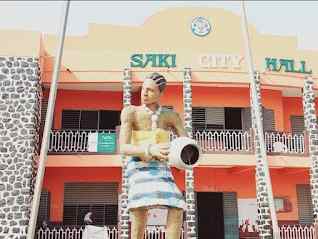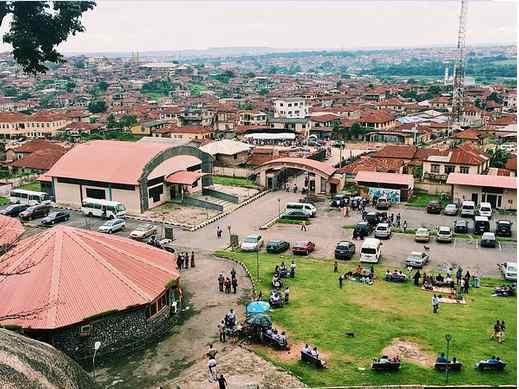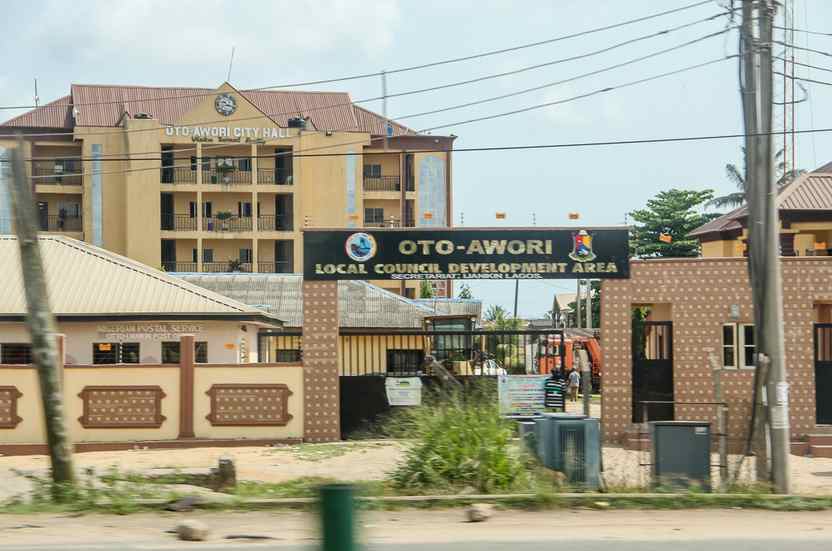
support@yorubalibrary.com
+2348073529208, 07038599574

Saki, sometimes spelled “Shaki,” is one of the most important and historic towns in the Oke-Ogun region of Oyo State, South-West Nigeria. Known as the Gateway to Oke-Ogun, Saki has long served as a commercial and cultural bridge between Yoruba land and neighboring regions. Its strategic location made it a hub for trade caravans in pre-colonial times, and to this day, it remains a major center of commerce, agriculture, and tradition.
Steeped in history, Saki is a town where Yoruba customs are greatly cherished and practiced. The people take pride in preserving their cultural values through festivals, oral history, and Oriki (praise poetry), which carry the memory of ancestral achievements. Historically, Saki’s economy and influence were strengthened by its fertile farmlands, making it a supplier of food and raw materials to many parts of Nigeria.
Saki is also a center of resilience and hospitality. The community’s identity reflects a combination of agricultural wealth, trading expertise, and a commitment to unity. Its markets, landscapes, and people create a vibrant atmosphere that has kept the town relevant in Yoruba land for generations.
Location and Geography
Saki is located in the northwestern part of Oyo State, sharing boundaries with the Republic of Benin to the west. It is surrounded by other Oke-Ogun towns such as Iseyin, Kishi, and Okeho. The area features a mix of tropical savanna and forest vegetation, with rich, arable land ideal for farming. The climate and terrain support the cultivation of both cash and food crops.
Cultural and Historical Significance
Saki is known for its agricultural festivals, traditional leadership structure, and market systems. Its central position in Oke-Ogun has made it a meeting point for various Yoruba subgroups, strengthening its role as a unifying town. Cultural events often include drumming, dancing, and praise poetry recitations that honor the town’s warriors, farmers, and leaders.
People and Occupations
The people of Saki are predominantly Yoruba, with farming as the backbone of the local economy. Major crops include yam, maize, cassava, tomatoes, and pepper, while cattle rearing and trading also contribute significantly to livelihoods. The town is famous for its bustling markets, such as Oja Oba and Oja Sango, where goods are traded in large quantities.
Unique Features of the Town
Saki’s landmarks include traditional palaces, historical shrines, and natural landscapes that hold cultural and spiritual importance. The town’s vibrant market life, combined with its agricultural production, makes it a critical economic player in Oyo State.
Oriki Ilu Saki
Below is the traditional Oriki (praise poetry) of Saki, celebrating its agricultural abundance, strategic position, and the enduring pride of its people.
Saki Ile Ogun O Ro Kin
Agbede ,O Ro Bata
Oke Gulutu ,Igbo Asabari
Asabari O Ko Ija
Ologun O Ni Kare
To Ba D’ojo Ere Kee Ranse ,
P'ologun Saki Ni Ile Ogun O Ro Kin
Agbede O Ro Baba
Gbe Do Gbe Do Le Gbe Agogo
Alagbede O Lee R Ojugun
Saki Nile Ara Ilagbede
Agbede Faka, Fiki ,Lonaa Ti Ire, Ire Mogun
Alagbede, Ki Le Te Owo Gbowo
Won Ani E Da Sile ,E Maa Lo
Eji Gbojo, Ara Ilagbede
Omo Awon Rin ,Tunrin ,Rorin
Boo Ba Ba Won Fin Ina Won Ni Oseun,
Boo Si Ba Won Fina Na Won Ni O Oseun
Fin Ina, Fin Na n Be Lenu
Ara Ba Tete D’Aye Omo Alagbede Ri N Ba Je
Maa Du Loju ,Maa Dun Lenu ,Maa Sugbon ,
Isale Mi Wowo ,Ri WO Wo Ri .
Aije Omo Alagbede Dun Mi .
Titi Eji Gboro
Omo Awon Irin
Tuniri Ro Irin.
Nile Alagbede Omo Ogun Oro Kini
Conclusion
Saki is more than a gateway; it is a pillar of strength, culture, and progress in Yoruba land. Its fertile soil, strong market systems, and cultural values make it a community that continues to influence the Oke-Ogun region and beyond.
Need more? Browse through our Oriki Gallery today, at zero cost.

Check out the detailed Oriki of Abeokuta, the capi…

The authentic Oriki of the Awori people, one of th…